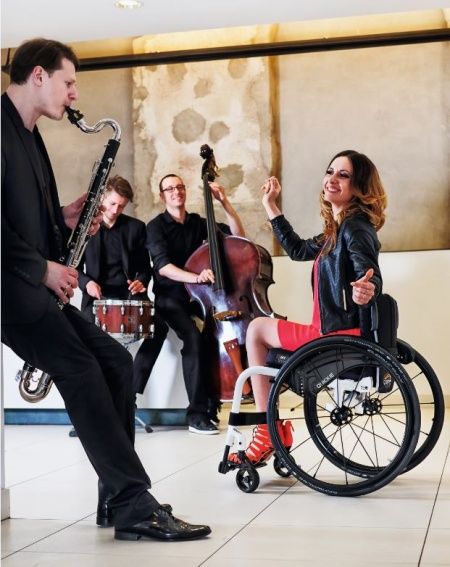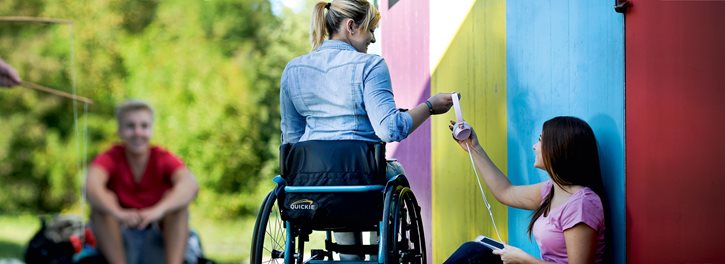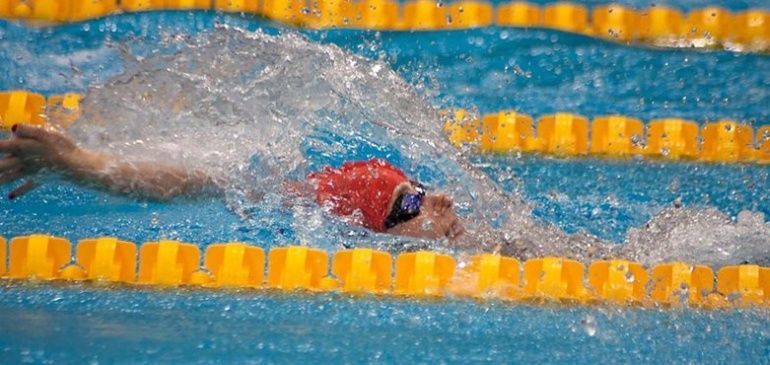Share:
Take it offline!
This Education in Motion resource is also available as a printable PDF.
Download PDF
In recent years, people with disabilities have been encouraged more than ever to lead an active life. That is not only because a more active lifestyle can improve and influence your mood and health, but also because you will feel more integrated in society.
Get ready, the list of activities for people with disabilities that we have built up, is almost as big as your expectations.
Activities for all personalities
There are some popular adapted sports (wheelchair tennis and basketball, adapted rugby and hand cycling, among others) that people with disabilities really enjoy. You can find a lot of adapted sports' followers and tournaments, so it will be easy for anyone to find companion to practice with.
Accessible tourism is another excellent option to stay active. Many cities are improving their infrastructures to have a good impact on the lifes of disabled people. Don't miss it!

In terms of culture, there are a lot of alternatives: adapted museums and accessible heritage sites, and the popular therapeutic routes, which are intended to enhance other senses in people with sensory impairments.
These are the most popular, but there are many other activities adapted for people with disabilities in which the degree of disability and age are not a major concern.
Here we give you some ideas for you to choose yours:
Music Therapy: arousing your emotions
Music therapy is not only advantageous at a psychologically, but also physically. This activity is something that is usually practiced in group, so it helps people with disabilities to enhance their group membership and self-esteem.
Physically, it can be beneficial to keep motor functions fit because of the movements and exercises if the activity also includes singing, dancing, instrument playing or body expression.

Wii Therapy: enhance your mobility
Video games have a lot of potential on a cognitive level, and can also serve as a rehabilitation tool. There are video consoles that have platforms such as the Wii Balance Board that allow the improvement of mobility in the joints, balance, visual-manual coordination, physical resistance and reflexes.
Some games also allow group participation of people with different disabilities, encouraging inclusiveness. "Wii Therapy" should be practiced in socio-health centres or similar, and always under the supervision of physiotherapists to make the most out of it.

Gardening: no-stress therapy
Therapeutic gardens and allotments are used as an activity for people with physical and intellectual disabilities, for both therapeutic and recreational purposes. The benefits of creating or actively participating in the care and conservation of a garden or allotment are related to the emotional bond that each person establishes with the plants and the natural environment. Therefore, "therapeutic gardening" brings with it a series of physical, emotional and cognitive benefits that can relieve tension and reduce stress.
Swimming pools: physical and neurological therapy
Water has been used as a therapeutic tool for years, and the practice of aquatic activities has a strong linkage with health enhancement. That is the reason why it is practiced by a lot of people and it is one of the most common adapted sports for people with physical disabilities.
Aqua-gym, swimming, passive stretching and therapeutic hydrotherapy are some of the examples of activities that significantly enhance functional ability, psychomotor skills and physical condition of the participants.
These activities are especially useful in the rehabilitation or treatment of pathologies that have a neurological origin, such as spinal cord injuries, head trauma, cerebrovascular accidents, degenerative diseases of the neurological system, spinal atrophies or spina bifida.

Leading an active life
Activities for people with disabilities are important for many reasons, but here we will discuss two. The first is that they are good on a physical and psychological level; the second is that many of them are designed to be carried out in groups, both with disabled people and others who are not, so they serve as the backbone of social relationships, allowing you to meet people and move both physically and socially outside your usual environment.
On the other hand, you must bear in mind that physical-recreational activities and exercise can help you burn calories and maintain muscle tone. This means, in that sense, any activity, even of low intensity, is positive and helps to accelerate metabolism.

Other benefits that you can notice in your health if you lead an active life are the improvement of your blood circulation, and getting to sleep more easily. On a psychological level, activity will increase your ability to concentrate and reduce stress.
Do you think you can’t do some of these activities? Are you worried that they aren’t adapted to your needs? Are you unsure which ones are best for you? Don’t be afraid: practically any activity is adapted, you just have to know how to do it and where.
If we discuss activities for people with disabilities organised by foundations, associations, socio-health centres, councils and public and private institutions, you will have all the guarantees, and they will advise you on this there.
Do you want to get to know more about adapted sports and activities? Sunrise Medical will have everything you need to start having this active life you desire. What are you waiting for?